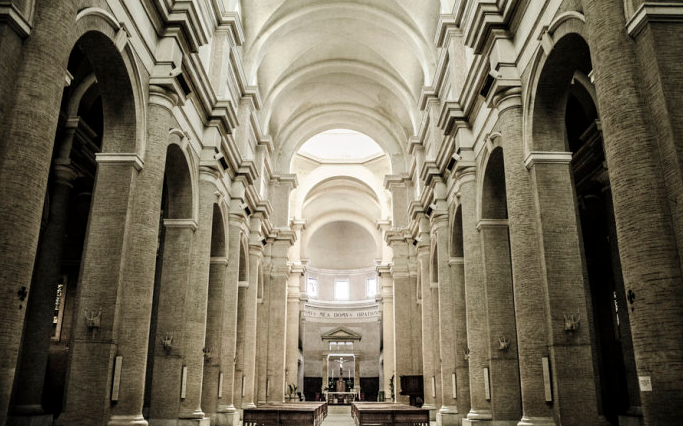Blood in ancient Rome ran thicker than marriage vows.
在罗马,血缘关系比婚姻誓约更深厚
A divorced woman was returned to the control of her oldest male relative until she remarried.
离婚妇女可以回到家中受家中最年长男性的控制直到她再婚
A widow was returned to the control of her son.
寡妇受儿子的管辖
Unsurprisingly, a wife's status in Roman tradition was roughly equivalent to that of her children.
毫不吃惊的是,罗马传统中罗马妇女的地位和她的孩子的地位相当
As the supreme god Jupiter was to the Universe,
因为至高无上的朱庇特主宰整个世界
so the father of the house was to his wife and to his children.
因此,一家之父主宰他的妻子和孩子
Roman society was the Roman family writ large.
罗马社会显而易见,都是这种家庭

The two social classes in early Rome
早期罗马社会中有两个社会阶层
were the patricians, which consisted of the upper class and the lower class called the plebeians.
一个是贵族,包括上层社会,下层社会叫做plebeian
The word patrician is derived from the Latin word pater, meaning father.
贵族这个词来自拉丁词语pater 意思是父亲
The word plebeian comes from the verb pleo, meaning just to fill up.
plebeian来自动词pleo意思是填满
According to the almighty mos maiorum,
根据无所不能的祖先的道路
the patrician class's relationship to the plebeians
贵族和平民的关系
was analogous to the power of the pater familias over his wife and children.
类似家庭中父亲对孩子和妻子的关系拥有绝对权力
Once the ancient Roman kings were run out,
一旦罗马国王任期结束
only patricians got to hold elected office and wield the almighty imperium.
只有贵族能执掌选举政府行使无上的统治权
Only patricians could command armies and dispense justice.
只有贵族能指挥军队分配法律
Plebeians were expected to do as they were told without any hope of bettering their lot.
平民应该按照指示做事而不应该希望改变自己的命运
Marriage between the two classes was strictly forbidden.
两个阶层之间的通婚是绝对禁止的
But to help take care of plebeian social concerns,
但是照顾平民是社会所关注的内容
the Romans developed a practice called patronage,
罗马有一项措施,叫做patronage
in which a given patrician served as patron.
也就是指定的贵族担任保护人
Yet another word derived from pater, to a number of plebeian clients.
patron这个词源自pater保护许多平民救济对象
The patron provided his clients help with legal protection,
贵族为救济对象提供法律保护
and he gave them hand outs when times were rotten.
在需要时提供帮助
He also commanded his clients in the army during war time and may even, when needed,have provided them with weapons.
战争时,贵族让救济对象参军甚至在需要时为他们提供武器
In return, clients did whatever favors the patron might ask.
最为回报,救济对象要满足贵族的一切要求
They often lined up at his house at daybreak to say good morning,
他们通常白天使在他的屋子里排队向他问好
and see if he had any work for them to do.
看看贵族是否有活让他们做
If the patron was running for political office,
如果保护人参政
the clients were expected to follow the patron around and serve as his bodyguards
保护对象就要跟着保护人担任保镖
and/or his applauding audiences.
和,或者鼓掌的观众
This patron-client relationship extended to all parts of Roman life.
这种主从关系延伸到罗马生活的方方面面
Also included in the mos maiorum
同样包括在祖先的传统中
was the cursus honorum or course of offices, through which a Roman could rise politically.
也就是一系列的官职通过这一举措,罗马人可以提升政治地位
Because opposition to monarchy had become a Roman core value,
因为反对君主制已经成为核心价值观
the Romans believed that politicians should rise up a ladder of offices to the highest office or consulship.
罗马人认为政治家应该升起阶梯到最高的办公室或者职位
While a politician didn't absolutely have to be a certain age to run for office,
尽管政治家不需要到特定年龄才能执政
or even to hold the office, previous office in the cursus honorum,
或者担任职位担任一定官职
exceptions were very few.
但是很少有例外
Holding a magistracy twice in a row was very strongly frowned upon by the mos maiorum.
连续执政两年在先人的规定中是得不到支持的
And here the offices come from the top down.
这里的政府是自上而下的
Two consuls, minimum age of service 43 years old.
两名执政官执政的最小年龄是43岁












